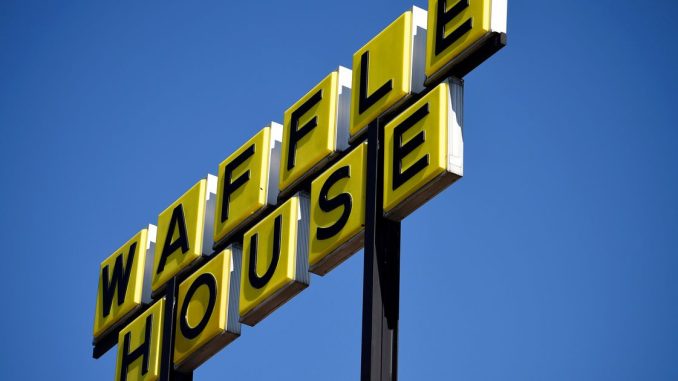
A union that’s organizing Waffle House workers filed a petition with the Labor Department on Monday, asking federal officials to investigate the iconic chain’s policy of deducting mandatory meal costs from workers’ paychecks.
Waffle House takes at least $3 for each on-shift meal out of workers’ pay, whether they end up eating it or not, according to the petition from the Union of Southern Service Workers. The USSW called it “especially alarming” since many workers are paid a tipped sub-minimum wage “as low as $2.90 per hour,” not including gratuities.
Three workers at a restaurant in Georgia walked off the job Monday for a one-day strike in protest of the policy, the union said.
The group said that many workers don’t have the time or desire to eat off the Waffle House menu every shift and that they often end up working through what should be their breaks.
“Waffle House is deducting their workers’ wages for meals that are ultimately being sold to customers at retail price,” the petition states.
Waffle House did not respond to a request for comment.
It is generally legal for employers to deduct the cost of employee meals, but they must be provided “at cost” and not at a profit to the company. A charge of $3 would be below the Waffle House menu price, but high if the meal isn’t eaten.
The union asked the Labor Department’s wage and hour division to determine the “actual cost” of the meal and whether Waffle House is overcharging employees.
“Waffle House gets enough money out of us.”
– Cindy Smith, Georgia Waffle House worker
Cindy Smith, a server at a Waffle House in Conyers, Georgia, told HuffPost she usually doesn’t eat the meal she’s charged for. She typically works 30 to 40 hours a week and sees $12 to $15 taken out of her pay for the food, according to the union’s petition.
Smith said she and two other employees at her restaurant notified their manager on Monday that they were striking for the day. She said they walked out at 10 a.m. in the middle of their shift.
“Why am I paying for food I’m not eating?” asked Smith, 50, who publicly protested the policy in the fall. “Waffle House gets enough money out of us.”
Smith said workers must pay full price if they want to take the meal to go, a policy listed in a portion of a Waffle House manual obtained by the union. She also said workers are charged extra for “premium” meats like steaks and pork chops.
“Meals must be consumed at the [restaurant] and no food can be taken home under this meal policy,” the manual states. “Any food actually taken home by such an Associate will be considered a ‘To Go’ order and must be paid for at full price.”
According to the document, workers should have an uninterrupted meal break during their shift, and those who don’t should be paid for the time it takes to eat before or after. But the union alleges that “almost no Waffle House worker” it spoke to said they were given paid time to dine when they worked through their breaks. Two workers cited in the union’s petition said they had to cook the meals themselves.
Founded in 1955, Georgia-based Waffle House has around 2,000 stores and 40,000 employees across the U.S., mostly in the South and Midwest. The company is privately owned and currently doesn’t franchise.
The USSW started a petition over the meal deductions last year and says “more than 450 self-identified Waffle House workers” have signed it.
“Although a $3 deduction per shift may seem de minimus, it can have a significant impact on Waffle House workers’ ability to provide for themselves and their family members,” the union told the Labor Department. “Like low-wage workers across the South, many Waffle House workers are living paycheck to paycheck and do not have stable housing and transportation.”
“Waffle House takes at least $3 for each on-shift meal out of workers’ pay whether they end up eating it or not, according to the petition.”
The USSW is a new branch of the 2 million-member Service Employees International Union. It formed last year out of the union’s long-running Fight for $15 campaign, which spearheaded fast food strikes and helped spur minimum wage hikes around the country. The USSW says it intends to organize low-wage workers in the South’s restaurant, retail and healthcare industries to “shift the balance of power between workers and corporations.”
Waffle House workers who are part of the union participated in a three-day strike in South Carolina last year, walking out over pay, safety and staffing grievances, according to The Post and Courier. One employee told the outlet they were “working for scraps and pennies.”
Smith has become an outspoken leader in the Waffle House campaign. She told HuffPost she recently gave her manager a “demand letter” calling for higher wages, consistent scheduling, around-the-clock security at the restaurant and an end to meal deductions.
A more reasonable system, she said, would be to let workers opt into or out of the meals rather than make them a default condition of the job.
“I usually just don’t have time to eat, or I wait until I get home,” Smith said. “I shouldn’t pay every day or on the days that I don’t eat.”


Be the first to comment